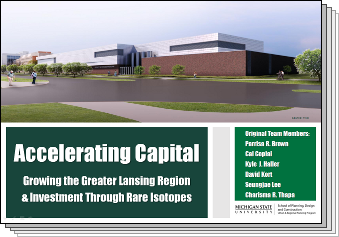Discovering and applying new and innovative economic development tools, models, policies, and programs
Creating Jobs and Wealth in Distressed Michigan Communities
2014: Accelerating Capital: Growing the Greater Lansing Region and Investment through Rare Isotopes
Student-Led, Faculty-Guided Project - 2014
Author(s): Parrisa Brown, Cal Coplai, Kyle J. Haller, David Kort, Seungjae Lee, Charisma Thapa, Michigan State University
Summary
This project involved an assessment of economic/entrepreneurial/ community impacts and opportunities created by the Facility for Rare Isotope Beams (FRIB) at MSU, and collected data and reported on existing particle accelerator facilities to recommend potential strategies and best practices to incorporate.
The Accelerating Capital Student-Led, Faculty-Guided Project was conducted in an effort to assess conditions and recommend strategies surrounding the Facility for Rare Isotope Beams (FRIB) particle accelerator facility on Michigan State University's campus. Construction started in 2014 and is scheduled to be completed in 2022. The facility will be instrumental in discovering properties of rare isotopes in order to better understand the physics of nuclei, nuclear astrophysics, fundamental interactions, and applications for society.
The MSU faculty and student team, with help from Lansing Economic Area Partnership (LEAP), aimed to compare elements surrounding the FRIB to successful existing facilities to strategize for a sustainable facility that will benefit the local community and economy. They chose four facilities that were similar in either size or scope upon which to conduct research. Those four are the TRIUMF Facility in Vancouver, Canada, the Jefferson Lab in Newport, Virginia, Fermilab in Batavia, Illinois, and the National Superconducting Cyclotron Laboratory (NCSL) on Michigan State's Campus.
After conducting all of their research, the project team made a few short term recommendations and many long term recommendations in anticipation of the facility's opening. The immediate action items include developing a branding and marketing strategy and continuing to investigate other incubator facilities for guidance. The medium term goal is to prepare a hazard mitigation strategy for the FRIB. And the long term recommendations include holding a series of community meetings, Accelerator Task Force meetings, establish an ongoing analytics and measurement plan specific to the FRIB, and to determine the feasibility of future MSU and LCC-specific degree programs related to accelerator technology.
In addition to REI's initial funding of the practicum project, LEAP's accelerator taskforce team received $70,000 in funding from Michigan Economic Development Corporation (MEDC) to further research implications and facilitate the development of an "accelerator region" surrounding the FRIB. After the initial project was completed, one student member of the practicum team was hired by Kuntzsch Solutions to stay on as a consultant and conduct further research based on "Accelerating Capital". As a result of the MEDC funding, LEAP and Kuntzsch Solutions collaborated on a seperate study titled "Accelerating Capital: Harvesting a Rare Opportunity for the Lansing Region's Particle Accelerator Industry". Some of the next steps for LEAP include emphasizing the importance of industry specific workforce specialization in the Lansing area, targeting advanced manufacturing, biomedical, and information technology companies as possible investors, and completing a branding and marketing plan for the FRIB.
Project Updated As Of September 30th, 2014
Webinars
Author Information
 Cal Coplai earned a degree of Urban and Regional Planning from Michigan State University in 2014, and a Urban Informatics Degree from Northeastern University in 2017. He currently works at Ford Motor Company as a Smart Mobility Data Scientist.
Cal Coplai earned a degree of Urban and Regional Planning from Michigan State University in 2014, and a Urban Informatics Degree from Northeastern University in 2017. He currently works at Ford Motor Company as a Smart Mobility Data Scientist.
View the Report


